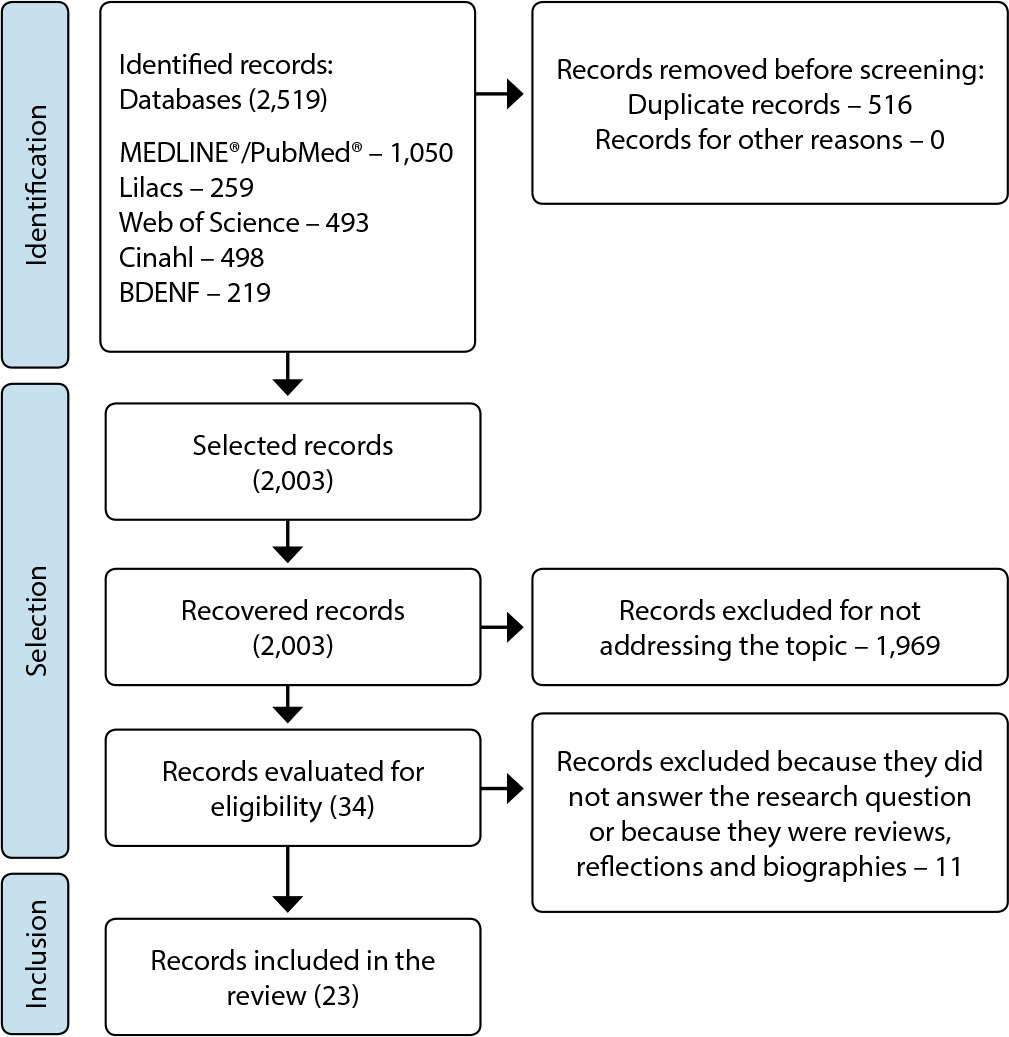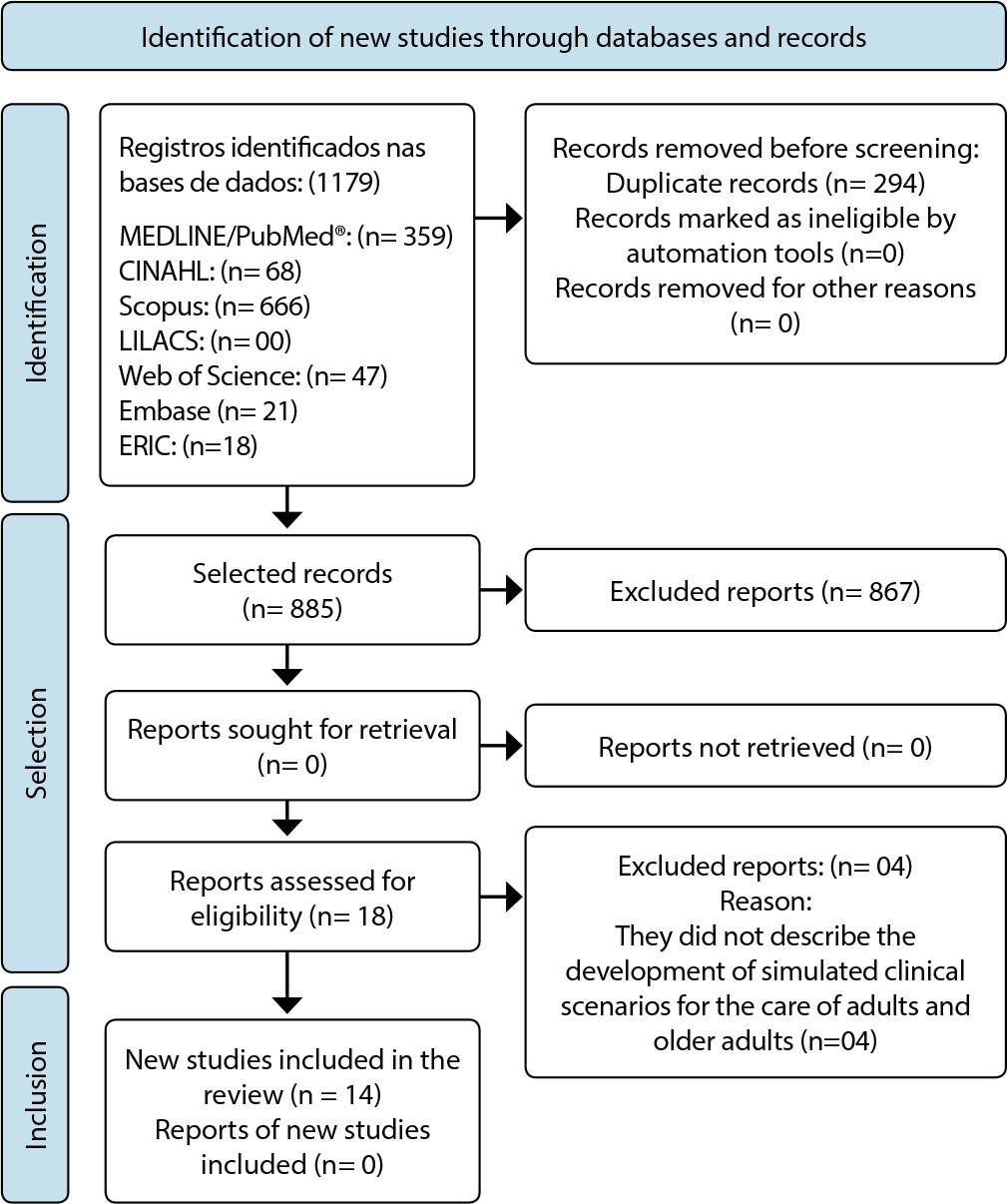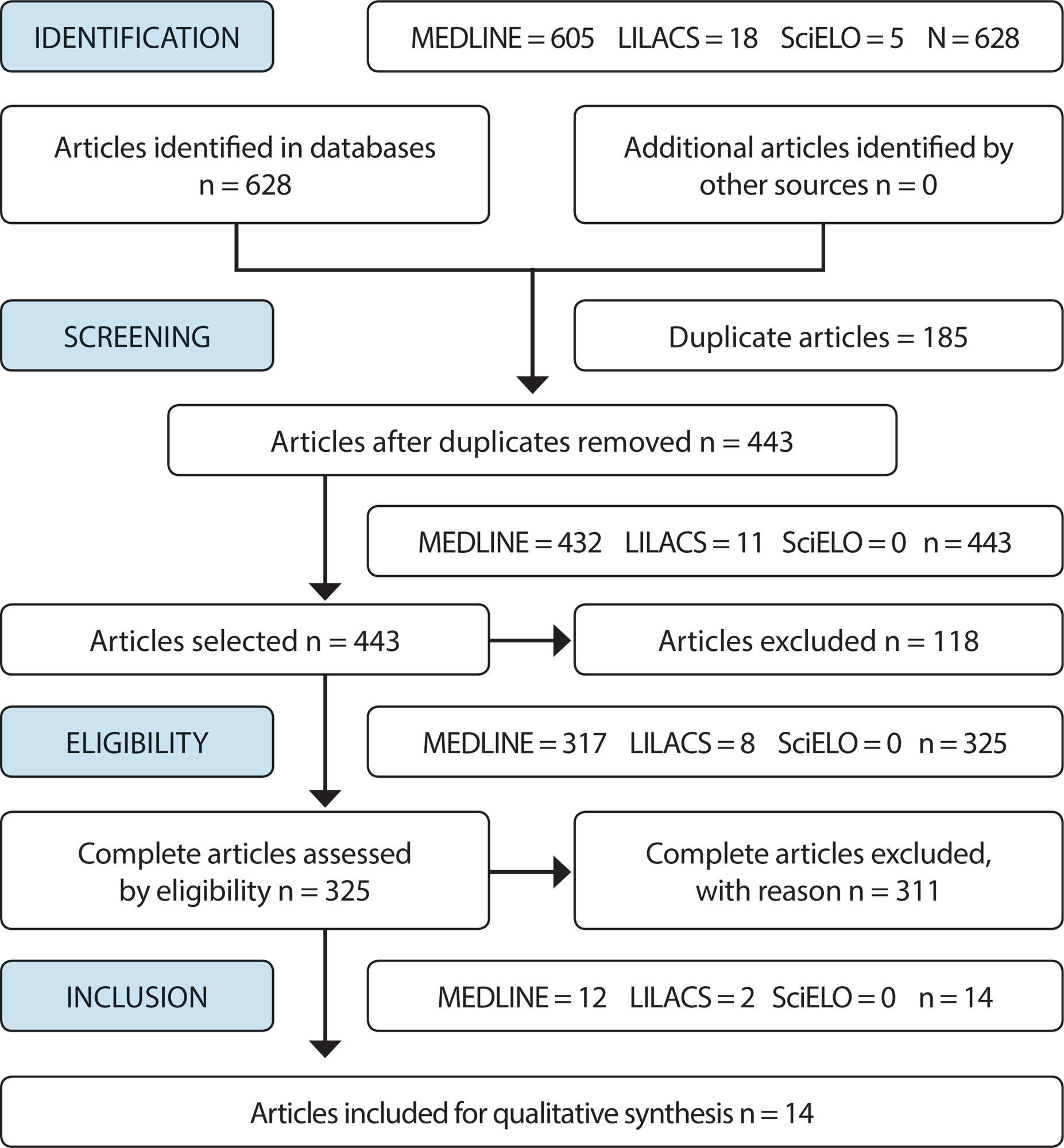-
ORIGINAL ARTICLE11-28-2023
Brazilian undergraduate nursing students’ critical thinking need to be increased: a cross-sectional study
Revista Brasileira de Enfermagem. 2023;76(1):e20220315
Abstract
ORIGINAL ARTICLEBrazilian undergraduate nursing students’ critical thinking need to be increased: a cross-sectional study
Revista Brasileira de Enfermagem. 2023;76(1):e20220315
DOI 10.1590/0034-7167-2022-0315
Views0See moreABSTRACT
Objectives:
to map Brazilian undergraduate nursing students’ critical thinking level and investigate the correlation between selected sociodemographic data and critical thinking domains.
Methods:
in this descriptive cross-sectional study, participants’ (N=89) critical thinking was assessed using the Health Science Reasoning Test. Correlation between critical thinking domains and sociodemographic data was assessed using the Pearson correlation coefficient.
Results:
the overall results showed a moderate level of participants’ critical thinking (mean = 70.7; standard deviation 5.7). A poor performance was identified in 5 of the 8 critical thinking domains. A significant positive correlation was found between education period and critical thinking (p<.001).
Conclusions:
poor level in students critical thinking domains may lead to negative consequences for their learning outcomes. Further studies should be carried out to confirm our results, in addition to investigation of teaching methods that encourage and ensure the development of students’ critical thinking skills during nursing education.
-
REVIEW11-28-2023
Contributions of the institutions for the nursing professionalization: integrative review (2010-2020) in the light of freidsonian conceptions
Revista Brasileira de Enfermagem. 2023;76(1):e20220153
Abstract
REVIEWContributions of the institutions for the nursing professionalization: integrative review (2010-2020) in the light of freidsonian conceptions
Revista Brasileira de Enfermagem. 2023;76(1):e20220153
DOI 10.1590/0034-7167-2022-0153
Views0See moreABSTRACT
Objective:
To analyze the contributions of the Brazilian Nursing Association and the Federal and Regional Nursing Councils in the literature for the professionalization of nursing in the light of Eliot Freidson’s theoretical conceptions.
Methods:
Integrative review of the literature, of socio-professional historical interest, carried out from June to November 2021, through the question: How did professional associations contribute to the professionalization of Brazilian nursing according to the literature from 2010 to 2020? The evidence were organized in a synoptic table, which allowed the construction of a conceptual map.
Results:
In the 23 selected studies, the professional associations presented scientific, social and political contributions, which shape the professional field of nursing, enabling knowledge/expertise, autonomy and self-regulation.
Final considerations:
The efforts of these institutions reaffirm nursing as an academic and consulting profession, capable of exerting control over the essence of nursing work. They strive to consolidate nursing as a legitimate professional field of health in Brazil.

-
11-28-2023
The diagnosis and treatment of latent tuberculosis by nurses in Brazil: a necessary strategy
Revista Brasileira de Enfermagem. 2023;76(1):e760101
Abstract
The diagnosis and treatment of latent tuberculosis by nurses in Brazil: a necessary strategy
Revista Brasileira de Enfermagem. 2023;76(1):e760101
DOI 10.1590/0034-7167.2023760101
Views0Tuberculosis (TB) prevention, from preventing the progression of infection to active TB, is the main strategy to reduce its incidence and to reach the goals defined by the World Health Organization, according to the End TB strategy().Brazil, ranking 19th in terms of the number of cases, assumed its commitment to institute preventive treatment, especially among […]See more -
REVIEW11-28-2023
Simulated scenarios in nursing: an integrative literature review
Revista Brasileira de Enfermagem. 2023;76(1):e20220123
Abstract
REVIEWSimulated scenarios in nursing: an integrative literature review
Revista Brasileira de Enfermagem. 2023;76(1):e20220123
DOI 10.1590/0034-7167-2022-0123
Views0See moreABSTRACT
Objectives:
to identify in scientific literature which simulated clinical scenarios were developed and validated for teaching and learning in nursing.
Methods:
integrative review, carried out in seven sources of information. The Rayyan program was used for selection, content analysis to explore the findings and the methodological assessment tool of the validity process, entitled Quality Appraisal tool for Validity Studies.
Results:
initially, 1,179 manuscripts were identified and 14 were part of the sample. Two categories were defined: Profile of simulated clinical scenarios produced in nursing; and Clinical skills developed and their assessment mechanisms.
Final Considerations:
there was a preponderance of high-fidelity scenarios, built in Brazil in the last five years, aimed at nursing students on the themes of emergency, maternal care and stomatherapy, addressing the assessment of cognitive, psychomotor and affective skills in nursing. Most studies obtained good methodological quality in their content validity process.

-
ORIGINAL ARTICLE11-28-2023
Factors associated with psychopathological symptoms among nurses at a university hospital
Revista Brasileira de Enfermagem. 2023;76(1):e20220075
Abstract
ORIGINAL ARTICLEFactors associated with psychopathological symptoms among nurses at a university hospital
Revista Brasileira de Enfermagem. 2023;76(1):e20220075
DOI 10.1590/0034-7167-2022-0075
Views0See moreABSTRACT
Objectives:
to analyze the factors associated with psychopathological symptoms among nurses at a university hospital.
Methods:
a cross-sectional study developed at a university hospital in Pernambuco, in which 90 nurses participated. A questionnaire with social and professional characteristics and the Symptom Assessment Scale were used.
Results:
an association was found between the variable changing profession and the presence of characteristic symptoms of psychoticism, somatization and anxiety among nurses.
Conclusions:
the emergence of psychopathological symptoms has influenced nurses’ desire to search for another profession. This evidence reinforces the need for greater investments in better working conditions and welcoming actions in the work environment, in order to provide a better quality of professional life and promote the health of these workers.
-
11-28-2023
O diagnóstico e o tratamento da tuberculose latente por enfermeiros no Brasil: estratégia necessária
Revista Brasileira de Enfermagem. 2023;76(1):e760101
Abstract
O diagnóstico e o tratamento da tuberculose latente por enfermeiros no Brasil: estratégia necessária
Revista Brasileira de Enfermagem. 2023;76(1):e760101
DOI 10.1590/0034-7167.2023760101pt
Views0A prevenção da tuberculose (TB), de impedir a progressão da infecção para a TB ativa, é a principal estratégia para reduzir a sua incidência e para o alcance das metas definidas pela Organização Mundial da Saúde, conforme a estratégia End TB().O Brasil, que ocupa a 19ª posição quanto ao número de casos, assumiu seu compromisso […]See more -
11-28-2023
O pensamento crítico dos estudantes de graduação em enfermagem brasileiros precisa ser ampliado: estudo transversal
Revista Brasileira de Enfermagem. 2023;76(1):e20220315
Abstract
O pensamento crítico dos estudantes de graduação em enfermagem brasileiros precisa ser ampliado: estudo transversal
Revista Brasileira de Enfermagem. 2023;76(1):e20220315
DOI 10.1590/0034-7167-2022-0315
Views0See moreRESUMEN
Objetivos:
mapear el nivel de pensamiento crítico de los estudiantes brasileños de pregrado en enfermería e investigar la correlación entre los datos sociodemográficos seleccionados y los dominios del pensamiento crítico.
Métodos:
en este estudio transversal descriptivo, el pensamiento crítico de los participantes (N=89) fue evaluada mediante el Health Science Reasoning Test. La correlación entre los dominios de pensamiento crítico y los datos sociodemográficos se evaluó mediante el coeficiente de correlación de Pearson.
Resultados:
los resultados generales mostraron un nivel moderado de pensamiento crítico de los participantes (media=70,7; desviación estándar 5,7). Se identificó un desempeño deficiente en 5 de los 8 dominios del pensamiento crítico. Se encontró una correlación positiva significativa entre educación y pensamiento crítico (p<0,001).
Conclusiones:
los bajos niveles de los dominios del pensamiento crítico en los estudiantes pueden tener consecuencias negativas para sus resultados de aprendizaje. Se deben realizar más estudios para confirmar nuestros resultados, además de la investigación de métodos de enseñanza que fomenten y aseguren el desarrollo de habilidades de pensamiento crítico de los estudiantes durante su formación en enfermería.
-
ORIGINAL ARTICLE11-28-2023
Handgrip strength in older adults and driving aptitude
Revista Brasileira de Enfermagem. 2023;76(1):e20210729
Abstract
ORIGINAL ARTICLEHandgrip strength in older adults and driving aptitude
Revista Brasileira de Enfermagem. 2023;76(1):e20210729
DOI 10.1590/0034-7167-2021-0729
Views0See moreABSTRACT
Objective:
to analyze handgrip strength as a predictor of the inability to drive in older adults.
Method:
a cross-sectional study conducted in traffic clinics with 421 older adults in Curitiba-Paraná from January 2015 to December 2018. A sociodemographic and clinical questionnaire, handgrip strength test, and queries from the National Registry of Qualified Drivers form were applied.
Results:
Reduced handgrip strength was not a predictor of inaptitude for vehicular driving (p=0.649). The predictors of inaptitude were: low education (p=0.011), incomplete elementary education (p=0.027), and cognition (p=0.020).
Conclusion:
reduced handgrip strength was not shown to predict for loss of driving skills in older adults. Low education level and reduced cognition level are conditions that were shown to be predictors for loss of vehicular driving license.
-
REVIEW07-06-2020
Middle-Range Theory for the Nursing Diagnosis of Low Self-Efficacy in Health
Revista Brasileira de Enfermagem. 2020;73(5):e20190370
Abstract
REVIEWMiddle-Range Theory for the Nursing Diagnosis of Low Self-Efficacy in Health
Revista Brasileira de Enfermagem. 2020;73(5):e20190370
DOI 10.1590/0034-7167-2019-0370
Views0See moreABSTRACT
Objectives:
theoretical validation of the concept of low self-efficacy in health as a nursing diagnosis construct.
Methods:
construction of a middle-range theory for validating diagnoses, comprised of five stages: definition of the approach for building the theory; definition of the main concepts; creation of a pictorial diagram; formulation of proposals; establishment of causal relationships and evidence for clinical practice. The main concepts were identified through a literature review and the studies were taken from the LILACS, SCOPUS, CINAHL and PubMed/MEDLINE databases. The final sample was comprised of 92 articles.
Results:
eighteen etiological factors and 16 clinical indicators were identified; characterized as antecedents and manifestations for inferring a diagnosis of low self-efficacy in health.
Conclusions:
the related concepts of the new nursing diagnosis of low self-efficacy in health, to be applied in clinical nursing practice, were identified and defined.

-
ORIGINAL ARTICLE05-24-2021
Critical thinking in nursing training: evaluation in the area of competence Education in Health
Revista Brasileira de Enfermagem. 2021;74:e20200979
Abstract
ORIGINAL ARTICLECritical thinking in nursing training: evaluation in the area of competence Education in Health
Revista Brasileira de Enfermagem. 2021;74:e20200979
DOI 10.1590/0034-7167-2020-0979
Views0See moreABSTRACT
Objective:
To analyze the constitution of critical thinking in nursing training in the approach by competence and the integrated curriculum, considering the evaluation process by capturing its challenges, and proposing overcoming strategies.
Methods:
Qualitative. In the first phase of data collection, interviews were conducted with twenty-four professors, nine preceptors, and fifteen students to reconstruct the profile of competence, and in the second phase, a workshop to validate the profile identified challenges and proposals. The Collective Subject Discourse was used to analyze the interviews and the holistic competence reference in reconstructing the profile.
Results:
The critical thinking is built based on experiences in the world of work, and evaluation is the conductor of reflections towards emancipation.
Final considerations:
It signals the importance of professor training in the learning evaluation and working with the collective construction of subjects to overcome challenges that happen in the changes of training.
-
07-26-2021
Impact of clinical supervision on job satisfaction and emotional competence of nurses
Revista Brasileira de Enfermagem. 2021;74(6):e20210125
Abstract
Impact of clinical supervision on job satisfaction and emotional competence of nurses
Revista Brasileira de Enfermagem. 2021;74(6):e20210125
DOI 10.1590/0034-7167-2021-0125
Views0See moreABSTRACT
Objective:
To evaluate the impact of implementing the SafeCare clinical supervision model on nurses’ job satisfaction and emotional competence profile.
Methods:
This is a quasi-experimental study, with a sample of 28 nurses from a hospital in northern Portugal. A self-administered questionnaire was applied, used as pre and post-test, which included: sociodemographic and professional characterization; “Job Satisfaction Scale”; and “Veiga Emotional Competence Scale”. We conducted descriptive statistical analysis and the Wilcoxon Test.
Results:
A significant decrease in the nurses’ satisfaction with hierarchical superior was observed in the post-test. No significant differences were found in the nurses’ job satisfaction and emotional competence after the implementation of the SafeCare Model.
Conclusion:
The SafeCare Model needs improvement, suggesting increasing the amount of training time administered to nurses and strengthening the healthcare institution’s link to the Model.
-
ORIGINAL ARTICLE07-10-2020
Working conditions and depression in hospital emergency service nurses
Revista Brasileira de Enfermagem. 2020;73:e20180952
Abstract
ORIGINAL ARTICLEWorking conditions and depression in hospital emergency service nurses
Revista Brasileira de Enfermagem. 2020;73:e20180952
DOI 10.1590/0034-7167-2018-0952
Views0See moreABSTRACT
Objective:
to analyze the presence, intensity and factors related to working conditions for depressive symptoms in hospital emergency nurses in the east of São Paulo.
Methods:
a descriptive, exploratory, quantitative and qualitative study, which applied psychometric scales and interview script.
Results:
nurses (95.24%) had depressive symptoms by the assessment scales by the observer, most with mild and moderate intensity. Inadequate working conditions led to suffering. Factors that trigger depressive symptoms were: disorganized work; harmful relationship with immediate management; inappropriate physician behavior; aggressions; lack of inputs, infrastructure and human resources; professional devaluation. Identified professionals with depressive symptoms who, because they were unaware of being affected by the disorder, did not seek treatment, continued to perform activities that compromised their physical and mental health, promoting damage to the assistance provided.
Final considerations:
high frequency of depressive symptoms. The precarious work environment negatively influenced the care and development of depressive symptoms.
-
ORIGINAL ARTICLE06-27-2019
Safety of the patient in an emergency situation: perceptions of the nursing team
Revista Brasileira de Enfermagem. 2019;72(3):753-759
Abstract
ORIGINAL ARTICLESafety of the patient in an emergency situation: perceptions of the nursing team
Revista Brasileira de Enfermagem. 2019;72(3):753-759
DOI 10.1590/0034-7167-2018-0544
Views0See moreABSTRACT
Objective:
To know the perception of nursing professionals about the essential aspects to provide safe care to polytraumatized patients in emergency services.
Method:
Descriptive and mixed study, performed with a focus group and projective techniques. The sample was made of seven nursing professionals. Data analysis took place through the Interface de R pour Analyses Multidimensionnelles de Textes et de Questionneires and SPSS 22.0 softwares.
Results:
Based on the analysis of participants’ speeches, three content partitions emerged in the Descending Hierarchical Classification. 1) Structure: need for changes; 2) The process: safe actions by the nursing team; and 3) Care free from damage as the sought result.
Conclusion:
Patient safety in emergency situations must rely on a proper environment and an organized sector, good conditions to transport patients, use of routines and protocols, identification and organization of the beds.

-
ORIGINAL ARTICLE06-24-2020
Practice of breastfeeding in quilombola communities in the light of transcultural theory
Revista Brasileira de Enfermagem. 2020;73(4):e20190191
Abstract
ORIGINAL ARTICLEPractice of breastfeeding in quilombola communities in the light of transcultural theory
Revista Brasileira de Enfermagem. 2020;73(4):e20190191
DOI 10.1590/0034-7167-2019-0191
Views0See moreABSTRACT
Objectives:
to identify factors that interfere with the practice of exclusive breastfeeding in quilombola communities.
Methods:
qualitative research based on the Transcultural Theory proposed by Madeleine Leininger, performed with quilombola mothers. For data collection, we used the semi-structured interview, conducted from June 2018 to January 2019. Content analysis was guided by the interactive model of Miles and Huberman.
Results:
it was revealed that intergenerational cultural myths and customs interfere with breastfeeding practice, and identified the influence of professional nurses on best breastfeeding practices.
Final Considerations:
cultural and intergenerational factors favor early weaning and expose the child to illness.
-
REVIEW10-28-2020
Health care of sexual and gender minorities: an integrative literature review
Revista Brasileira de Enfermagem. 2020;73:e20190192
Abstract
REVIEWHealth care of sexual and gender minorities: an integrative literature review
Revista Brasileira de Enfermagem. 2020;73:e20190192
DOI 10.1590/0034-7167-2019-0192
Views0See moreABSTRACT
Objectives:
to describe health care practices aimed at lesbians, gays, bisexuals, transvestites, and transsexuals.
Methods:
an integrative literature review based on systematic steps, in MEDLINE, LILACS AND SciELO databases and/or electronic libraries. It was held from September to November 2018, with articles published between 2012 and 2017, available in full in Portuguese, English, and Spanish, addressing health care to that population group.
Results:
fourteen articles were included. Most of the articles were about the trajectory of individuals within health services and showed limitations and obstacles in the use of these services.
Final Considerations:
there is evidence that factors related to organization of services, attitude of professionals, stigma, and discrimination experienced undermine health care practices. Therefore, it is essential to carry out educational activities in health services and educational institutions.

-
ORIGINAL ARTICLE06-01-2020
Nursing knowledge patterns: nurses’ image and role in society perceived by students
Revista Brasileira de Enfermagem. 2020;73(4):e20180959
Abstract
ORIGINAL ARTICLENursing knowledge patterns: nurses’ image and role in society perceived by students
Revista Brasileira de Enfermagem. 2020;73(4):e20180959
DOI 10.1590/0034-7167-2018-0959
Views0See moreABSTRACT
Objectives:
to understand high school students’ perception about the nurse’s image and role in society, from nursing knowledge patterns.
Methods:
phenomenographic qualitative study, developed between October 2017 and January 2018, in a public university in the countryside of the state of São Paulo, with eight Interdisciplinary Higher Education Program (Programa de Formação Interdisciplinar Superior) students. The findings were collected through semi-structured interviews and analyzed by the phenomenography framework, supported by rereading nursing knowledge patterns.
Results:
two categories emerged: Perception of nurses’ image, which contemplates their positive and negative characteristics, attributes and place where they operate; and Nurses’ role in society, in which their work is compared with physicians’.
Final Considerations:
despite their essential role in care, subordination to medical knowledge and lack of knowledge of nurses’ functions still reflect their image.
Search
Search in:
Nuvem de Tags
Adolescente (85) Atenção Primária à Saúde (239) COVID-19 (91) Criança (91) Cuidados de Enfermagem (269) Educação em Enfermagem (151) Educação em Saúde (139) Enfermagem (930) Enfermagem Pediátrica (86) Estudantes de Enfermagem (77) Estudos de Validação (131) Família (87) Idoso (208) Promoção da Saúde (99) Qualidade de Vida (104) Saúde do Trabalhador (86) Saúde Mental (145) Saúde Pública (82) Segurança do Paciente (150) Tecnologia Educacional (100)



